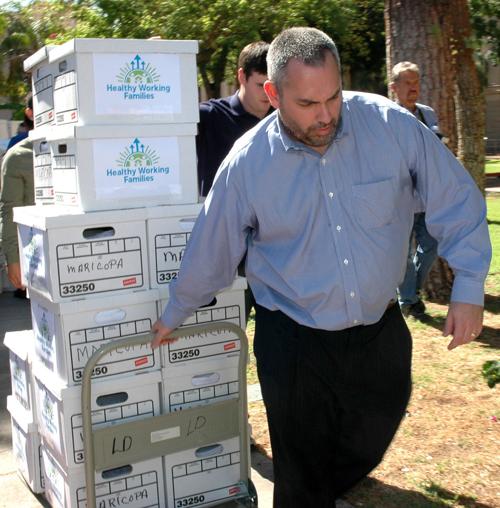PHOENIX — The private firm that collected signatures to put Proposition 206 on the November ballot is claiming it did not get fully paid.
In a lawsuit filed in Maricopa County Superior Court, Sign Here Petitions LLC says it is still owed $65,000 by backers of the proposal to raise the minimum wage to $12 an hour by 2020.
Attorney Paul Weich said that does not include a $1,000-a-day penalty that initiative organizers agreed to pay in late fees.
But Bill Scheel, the campaign’s manager, said if anyone breached the contract, it was the signature-gathering firm.
He said the contract required it to produce sufficient valid signatures to put the issue on the ballot.
But Scheel pointed out that Maricopa County Superior Court Judge Joshua Rogers disqualified tens of thousands of names because it turned out the circulators had not properly registered with the state.
The only thing that saved the measure from being thrown off the ballot is that the foes failed to file their challenge within five days after the petitions were filed. So Rogers ruled — and the Supreme Court affirmed — that the signatures gathered by the disqualified circulators could remain and be counted.
Weich scoffed at Scheel’s response.
“The fact is, they’re not off the ballot,” he said, adding the flaws in the circulators’ registrations are “kind of a moot point” because Rogers did agree to count the signatures.
The filing of the lawsuit did not go unnoticed by the Arizona Chamber of Commerce and Industry, which is leading the effort to persuade voters to reject the initiative.
Chamber spokesman Garrick Taylor derided initiative backers for failing to pay the bill.
++++++++-206 crowd says it’s the champion of the little guy, the small business that helped the initiative get to the ballot is taking a beating according to a lawsuit,” he said in a written statement.
But Scheel said that, given the signature-gathering company’s performance, he questions whether it earned the money — and added that it was already paid about $900,000.
He said the campaign committee is trying to make sure that individual circulators who properly gathered signatures are not stiffed and has paid out about $8,000 directly to circulators whose petitions were ruled valid.
Current law requires Arizona employers to pay at least $8.05 an hour, a figure based on the amount set in a 2006 voter-approved initiative plus inflation. That will go up automatically in January to $8.15.
Proposition 206 would put the 2017 minimum wage at $10 an hour, going to $12 in 2020, with future hikes linked to inflation.
It also would require workers to be given at least three days of paid sick leave each year.





